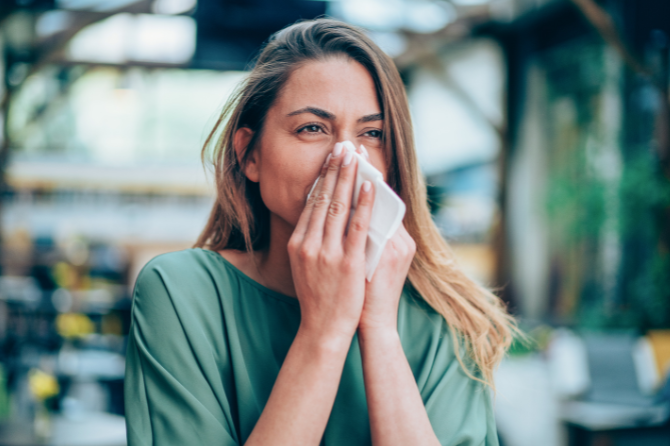
As the icy grip of winter loosens, spring ushers in a season of renewal, with blooming flowers and budding trees painting our landscapes in vibrant colors. However, for many, this rejuvenation also marks the onset of seasonal allergies, turning what should be a time of enjoyment into a period of discomfort. At OakBend Medical Center, we’re dedicated to ensuring our community not only understands the “why” behind these springtime sniffles but also knows how to combat them effectively, embodying our mission to provide exceptional, compassionate health care for all.
Why Are Allergies So Bad in Spring?
Spring allergies primarily stem from the increased presence of pollen, a fine powder released by plants as part of their reproductive cycle. Trees, grasses, and weeds all contribute to the pollen count, but it’s not just the quantity of pollen that’s to blame. Factors such as climate change and urbanization also play significant roles, extending the allergy season and increasing pollen concentrations in the air. According to the Centers for Disease Control and Prevention (CDC), climate changes can amplify pollen-related health issues by encouraging plants to produce more pollen and for longer periods.
What Helps Allergies in Spring?
Mitigating the effects of allergies in spring begins with understanding what triggers your symptoms. Over-the-counter antihistamines, decongestants, and nasal sprays can provide immediate relief, but long-term strategies are equally important. This includes staying indoors on high pollen days, using air purifiers to clean indoor air, and showering before bed to remove pollen. However, for personalized care, consulting with a healthcare professional is paramount. OakBend Medical Center’s experts can tailor treatment plans to your specific needs, offering a range of options from medication to allergy shots.
Remember, managing spring allergies is not just about dealing with the symptoms but identifying and minimizing exposure to allergens. For more detailed guidance, the American Academy of Allergy, Asthma & Immunology offers extensive resources and tips on allergy proofing your environment.
When Do Seasonal Allergies End?
The duration of allergy season can vary widely depending on your geographic location and the year’s specific weather patterns. Generally, tree pollen emerges first in late winter and early spring, followed by grass pollen in late spring and summer, and weed pollen in late summer and fall. This means that for some, allergy season can extend well beyond the spring months. Tracking local pollen forecasts through sites like the National Allergy Bureau can help you stay ahead of your symptoms and manage your exposure more effectively.
Tips to Reduce Seasonal Allergy Symptoms and Treatment
Beyond medication, there are several steps you can take to lessen your exposure to allergens:
- Keep windows closed during high pollen periods to prevent allergens from entering your home.
- Wear sunglasses and a hat when outdoors to shield your eyes and head from pollen.
- Wash bedding regularly in hot water to kill dust mites and remove pollen.
- Consult with healthcare professionals at OakBend Medical Center for advanced treatments, such as immunotherapy, which can significantly reduce or even eliminate allergy symptoms over time.
Conclusion
While spring allergies can be a nuisance, understanding how to manage them effectively can help you enjoy the season to its fullest. If you’re struggling with allergies, remember that you’re not alone. OakBend Medical Center is here to provide you with the care and support you need. With three clinics, including our newest one in Wharton, we’re making quality healthcare more accessible than ever. Interested in learning more about our services and how we can help you combat seasonal allergies? Visit our website at OakBend Medical Center or call us at 281-341-3000 for more information.
Leave a reply








FAST EFFECTIVE WAY TO GET CURED FROM HERPES VIRUS
Hello! I’m very excited to share what worked for me to everyone. I’m completely cured from my HSV1&2 with the use of natural medicine. I have used Oregano oil, Coconut oil, Acyclovir, Valacyclovir, Famciclovir and some other products/supplements and it hasn’t helped ever since I was diagnosed. I got outbreaks frequently and was completely devastated and I went online for a possible cure and how to get rid of Herpes.
On a fateful day after taking my bath, I took my phone and was going through some research, I bumped into a testimonial of a Herbs doctor { Dr Awase } who cures diverse diseases/viruses with Herbal medication. I was hopeful but also doubted the claim. But after a while I thought “what do I have to lose?” so I decided to reach out. He prepared a cure using roots and herbs which I steadily took for 14days as prescribed by him. I am quite glad I decided to reach out because I am totally cured from Herpes after a medical checkup was done by my Dr.
So I’ve decided to make a quick testimony for anyone out there who is probably suffering from an illness they can’t handle to reach out to Dr Awase. He specializes in curing lots of illnesses such as HIV, ENDOMETRIOSIS, PCOS, OVARIAN CYST, INFERTILITY, HEPATITIS A,B,C and lots more. I’m here to let you all know that you can also be cured just like me and you don’t have to live with any sort of illness for the rest of your life. To reach out, Contact him via WhatsApp below or Email
WhatsApp +2349074997110
Email:- dr.awaseherbalhome @ gmail .com
ReplyI have been suffering from Herpes for the past 1 years and 8 months, and ever since then I have been taking series of treatment but there was no improvement until I came across testimonies of Dr. Silver on how he has been curing different people from different diseases all over the world, then I contacted him as well. After our conversation he sent me the medicine which I took according .to his instructions. When I was done taking the herbal medicine I went for a medical checkup and to my greatest surprise I was cured from Herpes. My heart is so filled with joy. If you are suffering from Herpes or any other disease you can contact Dr. Silver today on this Email address: drsilverhealingtemple@gmail.com or Whatsapp +2348120513902
ReplyYou can simply opt for the ideas you see and blend in the bought <a href="https://www.northamericanjackets.com/product/james-spader-the-blacklist-raymond-reddington-brown-jacket"’>blacklist reddington jacket</a> or upper with the simplest outfits to make a statement.
ReplyHere is my testimony on how to get cured from HSV1&2. I got diagnose of HSV-2 and I have been taking pills to prevent an outbreak. I never stop searching for a cure because I strongly believe that there is something somewhere that can get rid of it completely and in February this year, I ran through some comments on a blog about Dr Oudo herbal cure and a lot of people commented about him having the herbs that can get rid of herpes completely. I was excited and I contacted Dr Oudo and ordered the cure for myself and he sent it to me through UPS and gave me instructions on how to take it which I rightly followed and behold I went for checkup after two weeks of taking the herbs and my result shows NEGATIVE. My doctor confirmed with me that I am totally clear from HSV-2. You can as well contact Dr Oudo to get the herbal cure from him. His email is droudo06@gmail.com
Reply👇👇👇
https://www.facebook.com./100187589035451
I have been suffering from Herpes for the past 1 years and 6 months, and ever since then I have been taking series of treatment but there was no improvement until I came across testimonies of Dr. Osbit on how he has been curing different people from different diseases all over the world, then I contacted him as well. After our conversation he sent me the medicine which I took according .to his instructions. When I was done taking the herbal medicine I went for a medical checkup and to my greatest surprise I was cured from Herpes. My heart is so filled with joy. If you are suffering from Herpes or any other disease you can contact Dr. Osbit today on this Email address: osbitherbalhome@hotmail.com or Whatsapp +2348058465905
Reply